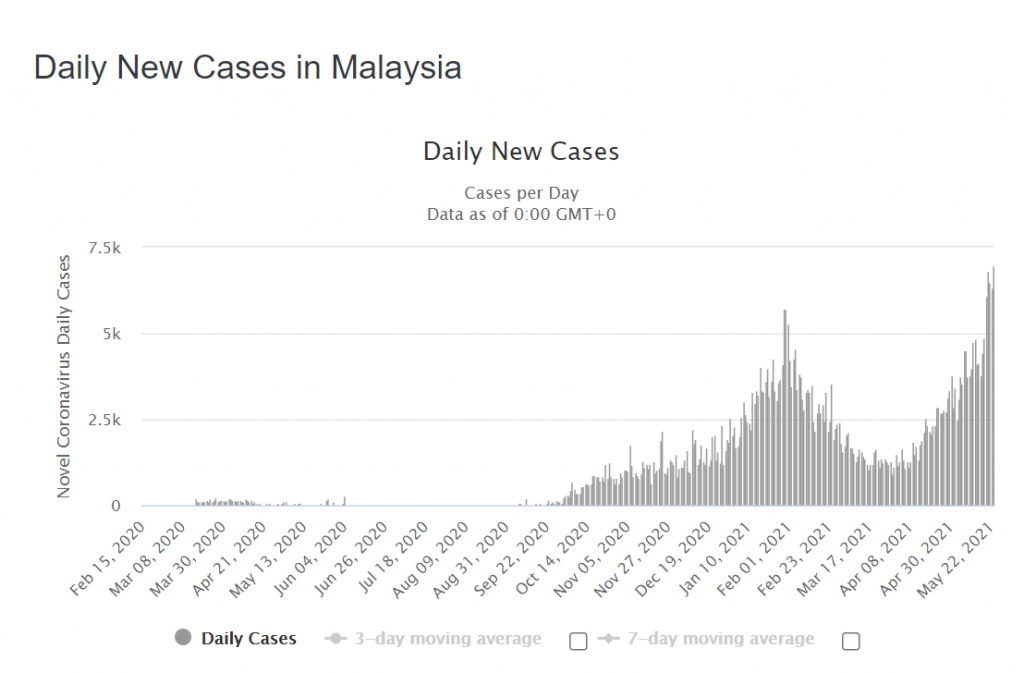Typically, when a lockdown is imposed, residents complain of not having the freedom to move around.
How can you take away my right to shop for completely unnecessary things in a mall? That’s a basic human right!
But, in Malaysia, some netizens are complaining that the lockdown is not strict enough, calling it “half-baked”.
With the recent surge in COVID-19 cases, they wondered why a stricter lockdown wasn’t imposed to stem the spread of the virus.
Now, thanks to Malaysia’s Prime Minister (PM), they have their answer.
M’sian PM Explains Why Strictest Level of MCO Was Not Implemented
In short, it’s because it had a devastating effect on the economy last year.
On Sunday (23 May), Malaysia’s Prime Minister Muhyiddin Yassin explained that the authorities are hesitant to impose the strictest lockdown due to the significant damage the first Movement Control Order (MCO) did to Malaysians’ livelihoods in 2020.
Mr Muhyiddin actually acknowledged that a strict MCO would be the best option to contain the escalating outbreak, as evident last year.

“Personally, even though I’m not a doctor, that’s the best way to contain the virus. This method has proven to be the most effective and also the easiest for the government, but we didn’t have any experience handling this pandemic before,” he said in a television interview.
However, after implementing it last year in March, the country lost hundreds of billions of dollars, which nearly caused their entire economy to crumble.
“We shut down everything during the MCO 1.0 and, because of that, Malaysians suffered, the country suffered, we lost RM2.4 billion (S$769 million) daily and unemployment shot up,” he said.
“I don’t want Malaysians to die of the coronavirus, I also don’t want Malaysians to die of starvation, so this is how we arrived at MCO 3.0.”
Difference Between First and Current MCO
As you might remember, during Malaysia’s first lockdown in March 2020, social activities were banned as people were required to stay at home. Businesses were also ordered to suspend operations.
Then, in a bid to prevent further damage to the economy, businesses were allowed to continue operating during Malaysia’s second lockdown, which began January 2021.
Now, Malaysia is nearly halfway through it’s third lockdown—or MCO 3.0—which will last four weeks. Consequently, economic activities will continue, but all social activities, events, dining-in at restaurants, as well as inter-district and inter-state travel are banned.
Inter-district and inter-state travel will only be permitted for emergencies, work, medical appointments, visiting of spouses, and for vaccination appointments.
In recent days, cases have spiked to nearly 7,000 cases daily, prompting the government to introduce new, stricter restrictions.

From tomorrow (25 May), malls, restaurants, and shops will be required to shorten their operating hours.
The authorities also urged 80% of civil servants—around 750,000 people—to start working from home, while the private sector has been advised to allow 40% of its staff to do the same.
In response to the criticism that the current COVID-19 measures aren’t strict enough, Mr Muhyiddin urged residents not to “point fingers” and to work together instead.
“Practise self-lockdown and stay safe,” he said.
The current lockdown is set to end on 7 June, though considering how previous lockdowns have been extended, this date could easily be amended.
At the moment, Malaysia has a total of 512,091 COVID-19 cases. 2,248 have died from the disease so far.
Feature Image: Farrel Arissa / Shutterstock.com




